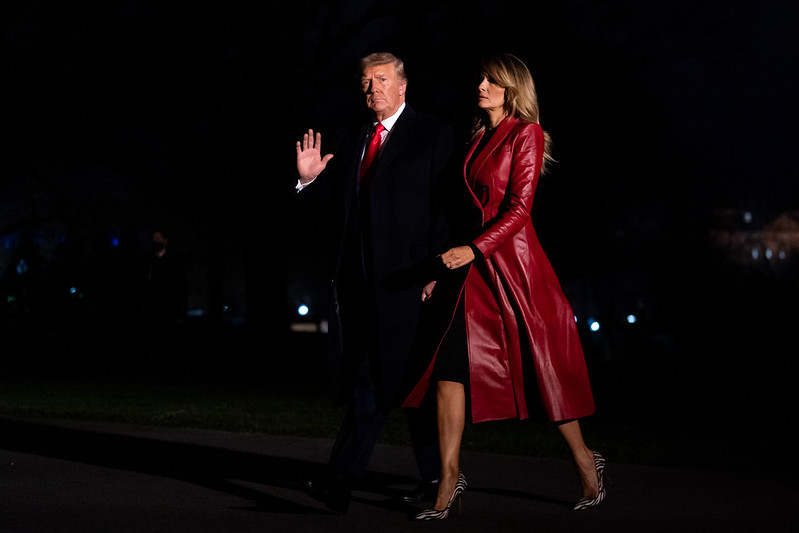
President Donald J. Trump and First Lady Melania Trump walk across the South Lawn of the White House Saturday, Dec. 5, 2020, concluding their trip to Valdosta, Ga. (Official White House Photo by Tia Dufour)
News over the weekend suggested that the recent conviction of Donald Trump in New York City may be in jeopardy of a mistrial because of the potential that one of the jurors was sharing information with a cousin. Now, A.R. Hoffman suggests that the case against Trump in Georgia, and the federal case against the president being led by Special Counsel Jack Smith may both be in trouble. Hoffman writes in The New York Sun:
Judge Aileen Cannon’s expansion of hearings to determine whether Special Counsel Jack Smith is constitutionally appointed brings into focus the possibility that two of the prosecutors pursuing President Trump could soon find themselves disqualified.
In Georgia, the Court of Appeals has frozen District Attorney Fani Willis’s racketeering case against Trump and 18 others while it considers whether to disqualify her. The Mar-a-Lago prosecution before Judge Cannon is also indefinitely delayed while Mr. Smith’s status is determined. Trump argues that the special counsel was unconstitutionally appointed by Attorney General Garland.
A revised schedule issued by Judge Cannon on Wednesday allotted an extra day of hearings on whether the Appointments Clause precludes Mr. Smith from helming the case. That suggests that she takes the challenge seriously. So does her decision to invite outside parties, or amici curiae, to make oral arguments in court. The Supreme Court calls that practice “extraordinary.”
The precarity of these prosecutors is a remarkable role reversal. In March, the Supreme Court turned back Colorado’s attempt to disqualify Trump on the basis of Section Three of the 14th Amendment, which bars insurrectionists from holding office. A unanimous high court held that the Colorado supreme court exceeded its authority when it ruled Trump ineligible for office. During oral arguments, Justice Elena Kagan wondered “why a single state should decide who gets to be president of the United States.” Chief Justice Roberts reflected that the “whole point of the 14th Amendment was to restrict state power.”
Now, the 45th president is the one whose arguments to disqualify are gaining traction. In a brief supporting that position filed before Judge Cannon, Attorneys General Meese and Mukasey argue that because Mr. Smith is not “clothed in the authority of the federal government,” he is a “modern example of the naked emperor. Improperly appointed, he has no more authority to represent the United States in this Court than Bryce Harper, Taylor Swift, or Jeff Bezos.”
In testimony before the House Judiciary Committee, the current attorney general, Mr. Garland, this week maintained that “there are regulations under which the attorney general appoints special counsel. They have been in effect for 30 years, maybe longer, under both parties.” Legislation authorizing independent counsels expired in 1999. It was replaced by what are known as the “Reno Regulations,” after a former attorney general.
Representative Thomas Massie, though, was not satisfied, responding that “none of those statutes, nor any other statutory or constitutional provisions, remotely authorized the appointment by the Attorney General of a private citizen to receive extraordinary criminal law enforcement power.” At the time of his appointment, Mr. Smith was prosecuting war crimes at the Hague, a role that did not require the confirmation demanded of United States attorneys.
Read more here.
Yesterday in the Judiciary committee, I asked AG Garland if Jack Smith’s Special Counsel office is even legal, and submitted former AG Meese’s amicus brief on that topic for the record. A few hours later, Judge Cannon agreed to allow that question to be debated in the courtroom. pic.twitter.com/TedmtbkmMP
— Thomas Massie (@RepThomasMassie) June 5, 2024
If you’re willing to fight for Main Street America, click here to sign up for the Richardcyoung.com free weekly email.




